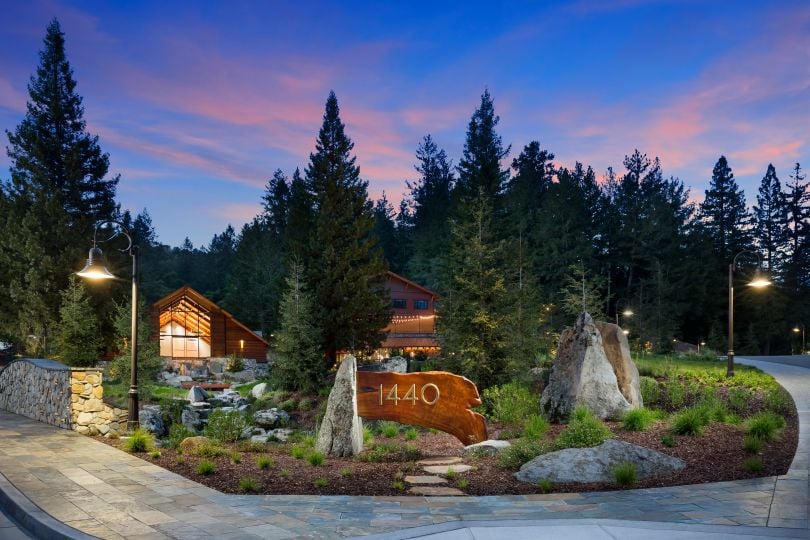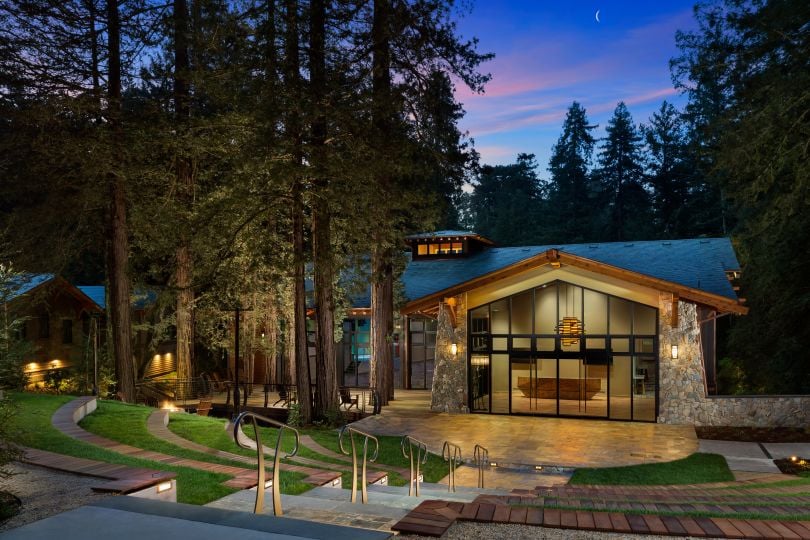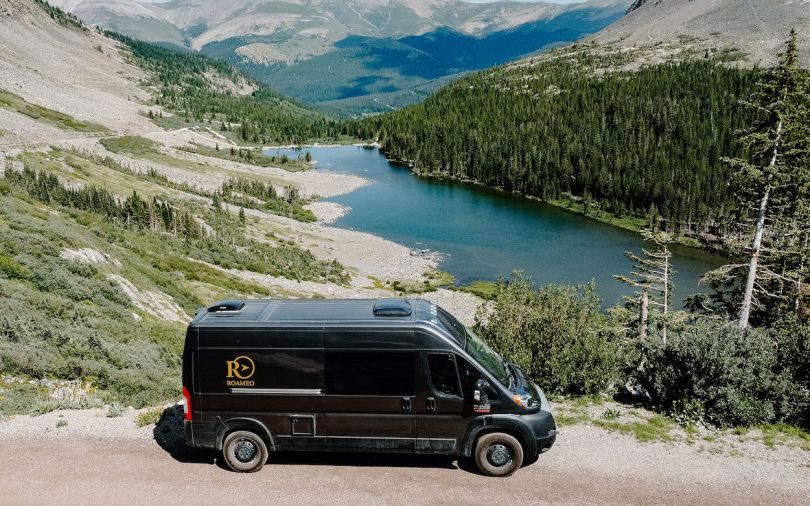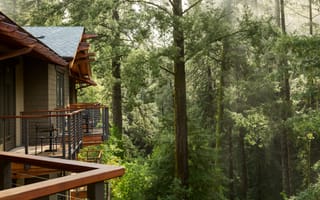Imagine you’re walking in California’s redwood forests. Birds are chirping, the air is warm, blue sky peaks through the lush green foliage above your head. As you walk you pass by folks gardening, doing yoga in the nearby amphitheater and cooking together in a communal kitchen.
This may sound like the makings of a popular vacation spot, but this is actually a description of Salesforce’s Trailblazer Ranch — a luxe new spot for the tech giant’s employees to connect. Starting next month, the company says its workers will be able to visit the property for any onboarding, training or talent development meetings they need, capping off nearly two years of predominantly remote work.
“The past two years have challenged us to reimagine not only how we work, but also how we connect — and what it means to build a culture in an all-digital, work-from-anywhere world,” Brent Hyder, the president and chief people officer at Salesforce, wrote in a recent blog post. “With Trailblazer Ranch, we’re igniting our culture for our next chapter. We’re reimagining how and where we connect for the new world we’re in. Our physical spaces serve a different purpose today than they did two years ago.”


This retreat site is an extension of Salesforce’s “Success from Anywhere” strategy it unveiled last year, which allows employees to choose either a fully remote, hybrid or entirely office based way to work — and supplies the necessary digital and in-person tools to do it. At Trailblazer Ranch, employees from all over can come together and participate in “tactile experiences” like guided nature walks, garden tours and cooking classes, which are intended to allow for “learning, planning and team-building,” said Hyder.
“After years of being on Zoom calls and staring at computer screens, we’re encouraging our employees to step away from their screens,” he continued, citing a recent study from professional services company Deloitte which claimed that employees are working three more hours a day compared to before the pandemic. “Trailblazer Ranch is an opportunity to disconnect from technology and connect with each other.”

A ‘New Standard’ for the Future of Work
That same Deloitte study also found that well-being in general has become a high priority for employees amid the pandemic, and employers are beginning to follow suit. Salesforce isn’t the only company leaning into nature and adventure to keep its team happy. Just a few months ago, Chicago-based logistics unicorn project44 announced it was making luxury van getaways a new employee perk.
This is thanks to a partnership with Roameo, a Colorado-based startup with a fleet of 22 souped-up conversion vans that are equipped with mobile internet, electricity, heating and air conditioning and even a shower. Project44 rented one of the vans, and is now allowing its employees to sign up and take it on “van-cations” when they want. So far, employees have gone everywhere from Salem, Massachusetts, to Key West, to the Badlands.
Kendall Raymond, a VP on project44’s people team who designed and manages this program, says the opportunity to spend time outdoors, “adventuring, gaining new perspectives” has had many benefits on employees — “creative thinking, innovation, mental health and happiness.” She added that the company will continue to provide the perk “so long as it is providing value to their team member experience.”
“Companies who wish to have best-in-class talent must innovate their team member experiences to attract, engage, and retain team members.”
“The outdoors have been a reprieve from the socially distanced society we have become accustomed to, especially in city settings,” she told Built In via email. “Over the last two years the world has changed at an accelerated rate. Talent across the globe has experienced blurred lines between work and life and as an output we have seen the workforce demanding a new age workplace experience. Companies who wish to have best-in-class talent must innovate their team member experiences to attract, engage, and retain team members. These reimagined team member experiences will set a new standard for the future of work.”
Indeed, Roameo’s founder and CEO Annie Aladjova says it has seen a surge in demand among companies like project44, so much so that it recently created a separate business unit specifically for enterprise clients. Roameo offers them a company-branded vehicle as well as a custom booking portal. It also takes care of all the scheduling and customer service so companies’ teams can more easily hit the road.
And Aladjova doesn’t foresee this rising interest going away anytime soon, claiming it all comes down to a “culture of distraction.”
“In both our professional and personal lives, we are constantly receiving messages on one platform or another, keeping up with news feeds, and stacking more calendar events than there are hours in a day. Getting outdoors enables you to refocus, whether that is yourself, your companions, or just a big task that doesn’t warrant an interruption,” she told Built In via email. “I only see this trend growing as technology exponentially increases our exposure to distractions.”

Making Work Perks ‘Meaningful’
Of course, this is all a part of a much larger conversation around worker burnout, retention and the ongoing Great Resignation. From pre-start date paid time off, to sabbaticals, to more nuanced health services — companies are pulling out all the stops to both attract and retain a talent pool with increasingly high expectations of their employers. A viral TikTok video posted just this week poked fun at the trend.
At the center of all this is wellness, especially when it comes to benefits focusing on concerns like fertility and mental health. Most recently, this has led to the success of companies like meditation app Headspace and fertility startup Carrot Fertility.
Khaled Kteily, the founder and CEO of male fertility clinic Legacy, claims a rise in unhealthy habits has inspired this “explosion” of companies wanting to “fight back” by investing in employees’ health in a “meaningful way” through the benefits they provide.
“As an employer, you want to help your employees bring their best, healthiest selves to work because lifestyle choices meaningfully impact if they’re showing up to work feeling rested, energized and creative,” Kteily told Built In via email, adding that he believes the trend “will only accelerate.”
In fact, Kteily says Legacy is the “preferred at-home male fertility partner” for major providers like Progyny, Maven, Kindbody and Carrot; and leading companies like Meta, Google and Amazon use it to offer fertility services to their employees. Today, Kteily added that Legacy’s services are covered by employers for about five million people across the country, and he expects that number to grow.
“It’s no surprise conversations about wellness and subsequent employer benefit-backing are increasing,” he said. “I think we’ll continue to see this trend expand into new areas of health and wellness.”
“Organizations that integrate well-being into the design of work at the individual, team, and organizational levels will build a sustainable future where workers can feel and perform at their best.”
And the strides made already appear to be working. According to a recent report put out by Maven and workplace culture company Great Place to Work, companies that choose to double down on “special and unique” benefits were twice as likely to retain working parents. Plus, the Deloitte report found that 80 percent of the nearly 9,000 workers they surveyed said prioritizing well-being was “important” or “very important” for their organization’s success.
“Covid-19 has reminded us of the dual imperatives of worker well-being and work transformation,” the report said. “Organizations that integrate well-being into the design of work at the individual, team, and organizational levels will build a sustainable future where workers can feel and perform at their best.”
This is precisely what Salesforce has set out to do with its Trailblazer Ranch. For now, the ranch is located at 1440 Multiversity in the town of Scotts Valley. Going forward it will also be open to local nonprofits and the surrounding community.




